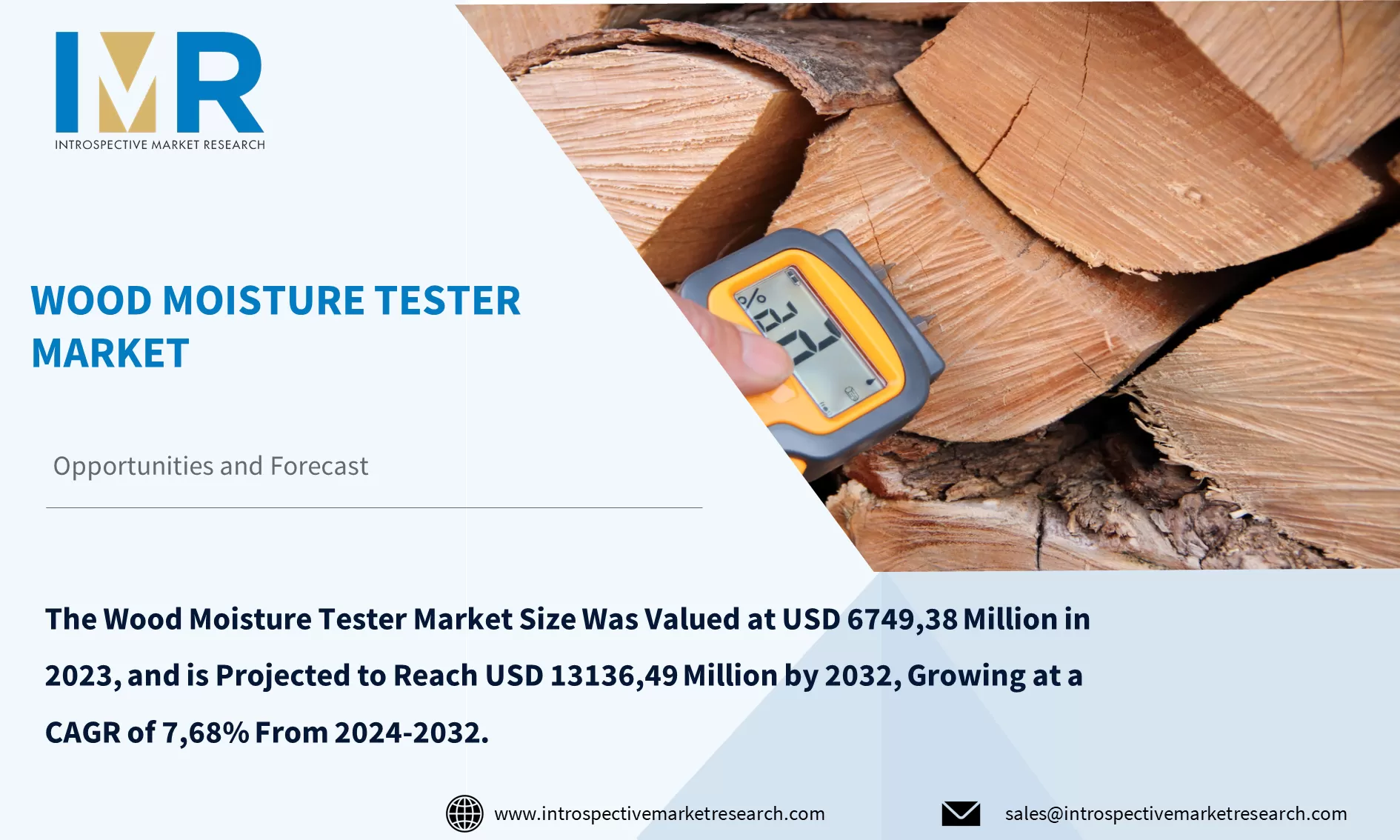Wood Moisture Tester Market
According to a new report published by Introspective Market Research, titled, ?Wood Moisture Tester Market by Type, Technology, Application, End-User, and Region: Global Opportunity Analysis and Industry Forecast, 2024?2032,?
the Wood Moisture Tester Market Size Was Valued at USD 6749,38 Million in 2023, and is Projected to Reach USD 13136,49 Million by 2032, Growing at a CAGR of 7,68% From 2024-2032.
A wood moisture meter is an instrument used to assess the moisture content of wood materials. It usually uses a sensor or probe to determine the moisture content of wood, providing accurate measurements for various applications such as woodworking, construction, and furniture manufacturing. Wood moisture testers are used in various industries, including woodworking, construction, and furniture manufacturing, to ensure the quality and longevity of wood products by accurately measuring moisture content. In woodworking, these testers help craftsmen determine the optimal moisture content for different types of wood, facilitating proper drying and preparation for various projects.
In construction, they assess the moisture content of wood and building materials, minimizing problems such as warping, mold growth, and structural instability due to excessive moisture. In furniture manufacturing, wood moisture testers are essential to verify that the wood used in furniture manufacturing has been properly dried, thereby avoiding defects and improving the longevity of the finished product. One of the main benefits of wood moisture testers is their ability to provide accurate and reliable measurements, allowing users to make informed decisions about the treatment and use of wood. By accurately measuring the moisture content of wood, these testers avoid costly errors and preserve the quality and integrity of the finished product.
According to the global Wood Moisture Tester Market is segmented into Type, Technology, Application, End-User, and region. By Type, the market is categorized into Portable, Pinless, and Pin-type. By Technology, the market is categorized into Digital and analog. By Application, the market is categorized into Construction, Furniture, Flooring, and Woodworking. By End-User, the market is categorized into Residential, Commercial, and Industrial. By region, it is analyzed across North America (U.S.; Canada; Mexico), Eastern Europe (Bulgaria; The Czech Republic; Hungary; Poland; Romania; Rest of Eastern Europe), Western Europe (Germany; UK; France; Netherlands; Italy; Russia; Spain; Rest of Western Europe), Asia-Pacific (China; India; Japan; Southeast Asia, etc.), South America (Brazil; Argentina, etc.), Middle East & Africa (Saudi Arabia; South Africa, etc.).
The growing demand for wooden furniture and interior decoration is emerging as one of the major drivers for the expansion of the wood moisture meter market. With consumers increasingly favoring wooden furniture and decorative elements in interior design projects, the demand for durable, moisture-resistant wood products is also on the rise. Wood moisture testers play a vital role in ensuring the longevity and resilience of wooden furniture by accurately measuring the moisture content of wood materials. By helping manufacturers and craftsmen assess moisture content and avoid problems such as warping and rotting, these testers help in producing high-quality wooden furniture that meets the stringent standards of consumers.
The integration of cutting-edge technologies such as wireless connectivity and smartphone compatibility presents a significant growth opportunity for the Wood Moisture Tester Market. As wireless communication and smartphone technology continue to advance, there is vast potential to augment the functionality and accessibility of wood moisture testers. By incorporating wireless connectivity features, these devices facilitate seamless data transmission and real-time monitoring, empowering users to remotely access and analyze moisture readings using their smartphones or other smart devices. Smartphone integration provides users with added convenience and flexibility, enabling them to conveniently view moisture measurements, monitor trends, and receive notifications directly on their mobile devices.
Global Wood Moisture Tester Market, Segmentation
The Wood Moisture Tester market is segmented based on Type, Technology, Application, End-User, and region.
Type:
The type segment is further classified into Portable, Pinless, and Pin-type. Among these, the Portable sub-segment accounted for the highest market share in 2023. The Handheld segment is positioned as the spearhead of the wood moisture meter market expansion. As the demand for practical solutions increases in industries such as construction, woodworking, and furniture manufacturing, handheld wood moisture testers are emerging as ideal options. These compact tools allow users to measure moisture content in wood materials quickly and efficiently without the need for bulky equipment or complicated setups. Portable wood moisture testers meet the requirements of professionals working in a variety of environments, including construction sites, workshops, and remote locations. Their lightweight, portable configuration ensures easy transportation and use in a variety of environments, facilitating quick moisture assessment and immediate decision-making.
Technology:
The Technology segment is further classified into Digital and Analog. Among these, the Digital sub-segment is anticipated to show the fastest growth by 2032. The digital segment is well-positioned to maintain its dominance in driving the expansion of the wood moisture meter market. As technological advancements reshape the woodworking and construction industries, digital wood moisture testers have become indispensable tools for industry professionals. These devices use digital sensors and sophisticated displays to provide accurate and reliable measurements of moisture content in wood materials. Additionally, digital wood moisture meters offer users features and capabilities that are superior to traditional analog models. They often incorporate digital displays to provide clear, user-friendly moisture readings as well as additional features such as data storage, logging, and analysis. The intuitive interface and ergonomic design of digital testers make them the preferred choice of professionals looking for efficiency and accuracy in moisture testing applications.
Region:
The Wood Moisture Tester market in Asia Pacific is projected to show the fastest growth by 2032. Asia-Pacific is emerging as a major region driving its expansion. The region?s rapid urbanization, infrastructural advancements, and rising construction projects, especially in countries such as China, India, and Southeast Asia, are fueling the demand for wood moisture testing equipment. In addition, the thriving carpentry and furniture manufacturing industry in the region is also increasing this demand, contributing significantly to the growth of the market. The growing awareness of the importance of moisture regulation in wood materials and stringent quality control requirements among construction companies are driving the adoption of wood moisture testers across the Asia-Pacific region. As industries increasingly prioritize efficiency and excellence in carpentry and construction operations, the demand for accurate and reliable moisture testing solutions is expected to increase.
Some of The Leading/Active Market Players Are-
- FLIR Systems, Inc (U.S.)
- Delmhorst Instrument Co. (U.S.)
- General Tools & Instruments LLC (U.S.)
- Wagner Meters (U.S.)
- Testo SE & Co. KGaA (Germany)
- Trotec GmbH (Germany)
- IMKO Micromodultechnik GmbH (Germany)
- Wohler (Germany)
- PCE Instruments UK Ltd. (UK)
- ELCOMETER LIMITED (UK)
-
Brookhuis Applied Technologies (Netherlands), and Other Active Players
Key Industry Developments
In January 2023, Renowned for providing quality moisture testing products for over 50 years, continued its legacy of excellence and innovation in 2022. Through ongoing enhancements and user feedback, the company strived to meet the evolving needs of its customers by introducing new products and revamping existing technologies to address market gaps. Wagner Meters launched a new technology in 2023, underscoring their dedication to continuous improvement and innovation. By staying at the forefront of moisture testing solutions, Wagner Meters reaffirmed its commitment to delivering superior products and services to its valued customers.
Key Findings of the Study
- The Wood Moisture Tester Market, valued at USD 6749.38 million in 2023, is projected to reach USD 13136.49 million by 2032, with a CAGR of 7.68% from 2024-2032.
- Increasing demand for wooden furniture and interior decoration is driving market growth, with consumers preferring durable, moisture-resistant wood products.
- Technological advancements, such as wireless connectivity and smartphone compatibility, are enhancing wood moisture testers, enabling seamless data transmission and real-time monitoring.
- The Asia-Pacific region is expected to experience the fastest growth due to rapid urbanization, infrastructural advancements, and rising construction projects, particularly in China, India, and Southeast Asia.






